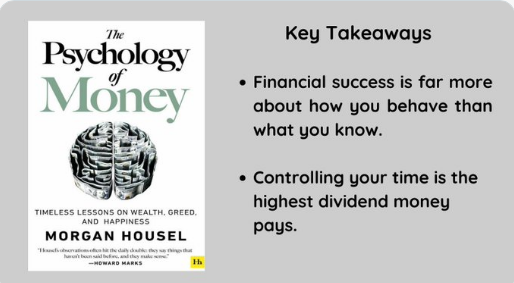
When it comes to understanding money, most people look for complex formulas, market predictions, or investment secrets. But Morgan Housel’s The Psychology of Money reveals a surprising truth — financial success is not about knowledge, it’s about behavior.
This book has quickly become one of the most influential personal finance books of all time, and for good reason. It changes how you think, feel, and act about money — teaching that true wealth comes from how you manage your emotions, not just your bank account.
Why “The Psychology of Money” Is a Must-Read for Everyone
Money affects every part of our lives, yet few people truly understand their relationship with it. Morgan Housel, an award-winning financial writer, takes readers on a journey through timeless lessons on wealth, greed, happiness, and human behavior.
Unlike typical finance books filled with charts and jargon, this one dives deep into the psychological side of investing and saving. Housel explains that two people with the same financial education can have completely different outcomes — simply because their experiences, fears, and attitudes toward money are different.
This insight is what makes The Psychology of Money so powerful. It’s not just about becoming rich; it’s about achieving freedom, balance, and peace of mind through smarter decision-making.
Key Lessons from “The Psychology of Money”
1. Behavior Matters More Than Knowledge
One of the most striking lessons in the book is that financial success depends more on behavior than intelligence. You don’t need to be a genius investor — you need to be consistent, patient, and emotionally disciplined.
Even the best investment plan will fail if you panic and sell at the wrong time. Wealth is built by those who can stay calm, think long-term, and resist emotional decisions.
2. The Real Value of Money Is Freedom
Housel says it best:
“Money’s greatest intrinsic value—and this can’t be overstated—is its ability to give you control over your time.”
This quote perfectly summarizes the book’s main idea. The ultimate goal of money is not luxury — it’s independence. When you control your time, you control your life. True wealth is being able to wake up and decide how you’ll spend your day.
3. Luck and Risk Play Bigger Roles Than We Think
The book humbly acknowledges that luck and risk are part of every financial journey. Many successful people underestimate how much luck contributed to their success, while others blame themselves too harshly for failures caused by bad luck.
Understanding this helps you stay grounded and make better, more rational decisions.
4. Save Money — Not Just to Buy Things, but for Flexibility
Housel emphasizes that saving isn’t about depriving yourself; it’s about buying options for the future. The more you save, the more flexibility you have — to change jobs, move cities, take a break, or handle emergencies without fear.
He reminds readers that wealth is what you don’t see — the unspent money that gives you security and choices.
5. Long-Term Thinking Is the Ultimate Financial Advantage
The secret weapon of every great investor is patience. The longer you allow your money to compound, the greater your results.
This is why consistency beats brilliance — small, steady progress creates exponential wealth over time.
Housel calls this “the magic of compounding behavior.” It’s not just about compounding money — it’s about compounding good habits.
Why This Book Stands Out in 2025
In a world of crypto hype, fast investments, and social media pressure to “get rich quick,” The Psychology of Money feels refreshingly timeless. It reminds readers that true financial success is slow, steady, and emotional.
Housel’s insights are especially relevant in 2025, when global economic uncertainty and digital distractions make emotional control more valuable than ever.
People who master their psychology around money — patience, perspective, and priorities — will always outperform those chasing the next trend.
Who Should Read “The Psychology of Money”?
This book is perfect for:
- Beginners who want to build a solid financial mindset before investing.
- Investors who struggle with emotional ups and downs.
- Entrepreneurs seeking long-term stability instead of short-term profits.
- Anyone who wants more freedom, happiness, and control in their financial life.
Whether you’re just starting your financial journey or already managing a portfolio, this book will reshape your understanding of what it means to be truly wealthy.
Real-Life Examples That Inspire
Throughout the book, Housel uses simple but powerful stories — from Warren Buffett’s discipline to everyday savers who achieved quiet success.
He shows how modest decisions, made consistently over time, can create extraordinary results.
The stories illustrate one core principle: Wealth is not about making money fast; it’s about keeping it, growing it, and enjoying life while doing so.
Final Thoughts — Mastering the Psychology of Wealth
If you want to change your financial future, you must first change the way you think about money.
The Psychology of Money gives you the mental tools to:
- Stay calm during market volatility
- Save consistently regardless of income
- Focus on freedom, not luxury
- Build wealth that brings true happiness
This book is a lifelong guide to financial peace — not through numbers, but through mindset.
💡 Powerful Quote to Remember
“Money’s greatest intrinsic value—and this can’t be overstated—is its ability to give you control over your time.”
That single sentence captures the essence of why this book belongs on every bookshelf.
🔥 Take Action: Start Your Financial Transformation Today
Don’t just read about financial freedom — experience it.
Click the button below to get your copy of The Psychology of Money by Morgan Housel and begin mastering the mindset that creates lasting wealth.
best personal finance books 2025, The Psychology of Money summary, Morgan Housel book review, how to build wealth mindset, investing psychology, financial freedom tips, how to think about money, personal finance guide, best investing books for beginners, how to save money and invest smartly